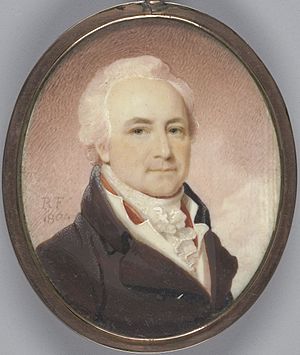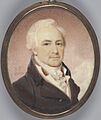Alexander Reinagle facts for kids
Quick facts for kids
Alexander Reinagle
|
|
|---|---|
 |
|
| Born | 23 April 1756 Portsmouth, England
|
| Died | 21 September 1809 (aged 53) Baltimore, Maryland, United States
|
| Occupation | Organist, theater musician, music teacher |
| Era | Classical |
Alexander Robert Reinagle (born April 23, 1756 – died September 21, 1809) was a talented composer, organist, and musician for the theater. He was born in England and later moved to the United States. He was a close friend of a young Mozart when Mozart visited London. Reinagle's music was inspired by famous composers like Haydn, Mozart, and Clementi.
Contents
Early Life and Music in Scotland
Alexander Reinagle was born in Portsmouth, England. His father was a professional musician from Hungary. His mother was from Scotland. Alexander studied music with his father. Later, he learned more from Raynor Taylor in Edinburgh, Scotland.
In 1763, Alexander traveled to London. A year later, he met Mozart and his family. At first, Reinagle worked in the shipping business. He made several trips to the American colonies in the 1770s. In Edinburgh, he taught music and held many concerts. His first keyboard songs were published in Glasgow. These songs became very popular in the American colonies.
Moving to America: New York and Philadelphia
In 1786, Reinagle decided to become a full-time musician. He moved to the newly independent United States of America. He first lived in New York City. Later, he moved to Philadelphia, which was the capital city at that time.
Reinagle helped bring music back to life in Philadelphia in the 1790s. He introduced the city to the music of Haydn and Mozart. He also shared his own original songs.
Reinagle and George Washington
One of Reinagle's biggest fans was the first American President, George Washington. In 1789, Reinagle wrote a special song called a "Chorus." It was performed for Washington in Trenton, New Jersey. This was during Washington's trip to become president.
Later, in Philadelphia, Washington's step-granddaughter, Nellie Custis, became one of Reinagle's music students. President Washington often went to Reinagle's concerts. He could often be seen in the audience. When Washington died in 1799, Reinagle wrote a sad song called Monody on the Death of George Washington.
In Philadelphia, Reinagle worked closely with Thomas Wignell. They created many opera ballets for the New Company at the Chestnut Street Theater. Reinagle and Wignell put on over 75 shows together. After Wignell died in 1803, Reinagle moved to Baltimore, Maryland. He worked with the Holliday Street Theater there. He passed away in Baltimore in 1809. He is buried in Old Saint Paul's Cemetery.
Reinagle's Music Style
Reinagle's early songs from his time in Edinburgh include pieces for two cellos. He also wrote Variations on Famous Scots Tunes. These were published in Glasgow and later in Philadelphia. He also composed Twenty-four Short and Easy Lessons. These were teaching songs for keyboard. He used them to teach his students in Philadelphia.
Once in America, Reinagle kept writing short songs for special events. These songs often had names related to American people and ideas. For example, he wrote Federal March, President Madison’s March, and Mrs. Madison’s Minuet. These songs were usually short. They were often in a simple two-part form, like dance music of that time.
More interesting are his four keyboard sonatas. Reinagle wrote these when he first arrived in Philadelphia. Because of this, they are sometimes called the "Philadelphia Sonatas." These were the first sonatas ever written in the United States. They are important works, each with two or three parts. They show the influence of C. P. E. Bach, who was one of Reinagle's heroes. But they also show Reinagle's own special way of writing music.
Sadly, much of Reinagle's theater music was lost. The Chestnut Street Theater burned down in 1820.
Selected Stage Works
Reinagle wrote music for many stage shows. Here are a few examples:
- Robin Hood, or Sherwood Forest (1794 Philadelphia)
- St Patrick's Day, or The Scheming Lieutenant (1794 Philadelphia)
- Harlequin Shipwreck'd, or The Grateful Lion (1795 Philadelphia)
- The Volunteers (1795 Philadelphia)
- Columbus, or The Discovery of America (1797 Philadelphia)
- The Constellation, or A Wreath for American Tars (1799 Philadelphia)
Images for kids
 | Lonnie Johnson |
 | Granville Woods |
 | Lewis Howard Latimer |
 | James West |


